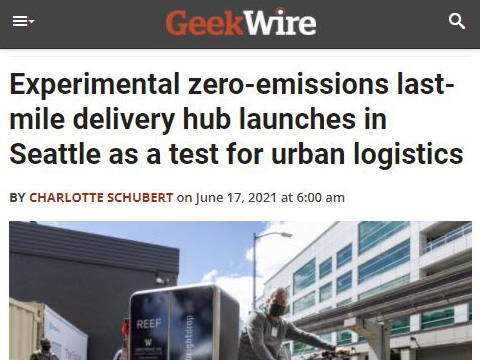
By Charlotte Schubert
Seattle’s first neighborhood delivery hub is now live.
The hub, in a parking lot near the Space Needle, brings together companies working in transportation, delivery logistics and food preparation to help solve the “last mile” problem — the expense and environmental cost of the last leg of delivery.
The problem is a focus of the University of Washington’s Urban Freight Lab, which estimates that just the last 50 feet of delivery accounts for 25-to-50% of transportation supply costs. The lab examines new ways to structure transportation systems through private-public partnerships. The neighborhood delivery hub is its new pilot project.
“Our goal is to make space to encourage experimentation,” said Anne Goodchild, the lab’s director and a professor of civil and environmental engineering. “But that experimentation is going to be done by companies already working in this space.”
The hub serves as a delivery point for trucks, which offload parcels onto an electric-assist cargo trike or directly into a parcel locker. Goodchild envisions the hub not only as a solution to the last-mile delivery system, but as a neighborhood gathering place where people can grab a meal and socialize while picking up their packages. Companies involved in the project include:
- Coaster Cycles, a Missoula, Mont., startup that makes electric-assist cargo trikes. Their on-site trike will haul packages for the meal service HelloFresh and other companies to the surrounding neighborhood.
- BrightDrop, a spinout of General Motors generating first-to-last mile products. BrightDrop has made an electric-assist rolling parcel carrier that attaches to the trike and can disengage for hand pushing.
- AxleHire, a logistics startup that provides route-optimization technology for last-mile service. The company will coordinate deliveries.
- REEF, a Miami-based startup that expanded from managing parking lots to providing infrastructure for neighborhood hubs. REEF manages the lot and operates a neighborhood kitchen on site. Customers can now order a SoCal or NorCal Burrito from Man vs. Fries, a small chain that operates out of other REEF locations in the U.S. The kitchen is also designed to partner with Seattle restaurants, providing a small-footprint local option for delivery.
The Seattle Department of Transportation is a partner on the project, which dovetails with a program to foster cargo bike use and a 2030 goal to achieve 30% zero-emission delivery in the city, said Kelly Rula, the department’s New Mobility Manager.
“The concept of micro-hubs is really taking off internationally as a really exciting new experimental space,” said Rula. She noted that New York City runs a cargo bicycle program with more than 350 bikes. Amazon is a partner in the New York program, and is initiating a cargo bike program in London. In January 2021, there were more than 45,000 cargo bike deliveries in New York, according to a city evaluation, and each bike saves seven tons of carbon dioxide per year. Amazon is a partner at the Urban Freight Lab, though is not involved in the new hub project.
The Seattle delivery hub brings additional services together with cargo bike delivery and, “is a great example of how one space can be used for a lot of different interesting uses,” said Rula.
The project will help the the city understand the infrastructure needed to support new delivery modes, said Rula, who noted that cargo bikes currently don’t have license plates. As another example, the parcel locker, which accepts deliveries from all carriers, required its own postal address, said Goodchild. The locker accepts deliveries from all carriers, and people living or working nearby can sign up for locker delivery at belltownlockers.com.
The Urban Freight Lab will be monitoring the new project through a series of sensors, for instance assessing reductions in road traffic and the number of parcels delivered to the locker. Researchers will estimate carbon dioxide savings compared to conventional truck-based delivery systems.
Delivery hubs have the potential to reinvigorate community within an e-commerce delivery system, said Goodchild. Hubs can be integrated into the neighborhood, as a place where people pick up their packages and buy coffee from a stand or play with their children at an attached park, she said.
“It’s like a modern shopping center, or neighborhood store,” said Goodchild of the concept. “It’s lower emissions, and it’s adapted to the new retail model, but it’s still a community benefit.”
The hub is located at 130 5th Ave. N, in what some locals call the Uptown neighborhood.